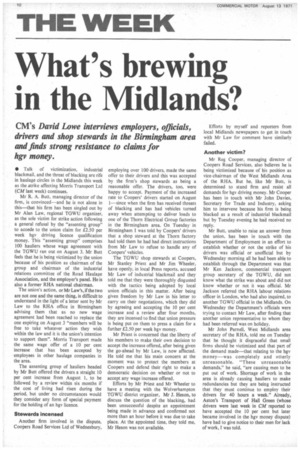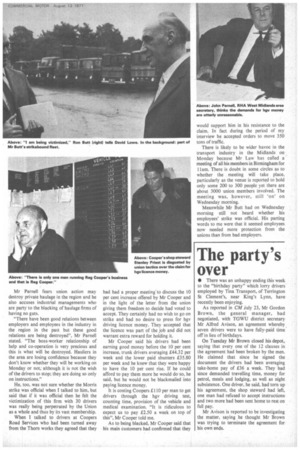What's brewing in the Midlands?
Page 12

Page 13

If you've noticed an error in this article please click here to report it so we can fix it.
CM's David Lowe interviews employers, officials, drivers and shop stewards in the Birmingham area and finds strong resistance to claims for hgv money.
• Talk of victimization, industrial blackmail, and the threat of blacking are rife in haulage circles in the Midlands this week as the strike affecting Morris Transport Ltd (CM last week) continues.
Mr R. A. Butt. managing director of the firm, is convinced—and he is not alone in this—that his firm has been singled out by Mr Alan Law, regional TGWU organizer, as the sole victim for strike action following a general refusal by the "assenting group" to accede to the union claim for £2.50 per week hgv driving licence qualification money. This "assenting group" comprises 100 hauliers whose wage agreement with the TGWU ran out on August 3. Mr Butt feels that he is being victimized by the union because of his position as chairman of the group and chairman of the industrial relations committee of the Road Haulage Association, and the employer's panel. He is also a former RHA national chairman.
The union's action, or Mr Law's, if the two are not one and the same thing, is difficult to understand in the light of a letter sent by Mr Law to the RHA office in Birmingham advising them that as no new wage agreement had been reached to replace the one expiring on August 3 "members will be free to take whatever action they wish within the law and it is the union's intention to support them". Morris Transport made the same wage offer of a 10 per cent increase that has been accepted by employees in other haulage companies in the area.
The assenting group of hauliers headed by Mr Butt offered the drivers a straight 10 per cent increase from August 1, to be followed by a review within six months if the cost of living had risen during the period, but under no circumstances would they consider any form of special payment for the holding of an hgv licence.
Stewards incensed Another firm involved in the dispute, Coopers Road Services Ltd of Wednesbury, employing over 100 drivers, made the same offer to their drivers and this was accepted by the firm's shop stewards as being a reasonable offer. The drivers, too, were happy to accept. Payment of the increased rate to Coopers' drivers started on August 1—since when the firm has received threats of blacking and has had vehicles turned away when attempting to deliver loads to one of the Thorn Electrical Group factories in the Birmingham area. On Tuesday in Birmingham I was told by Coopers' drivers that a shop steward at the Thorn factory had told them he had had direct instructions from Mr Law to refuse to handle any of Coopers' vehicles.
The TGWU shop stewards at Coopers, Mr Stanley Priest and Mr Jim Wheeler, have openly, in local Press reports. accused Mr Law of industrial blackmail and they told me that they were thoroughly disgusted with the tactics being adopted by local union officials in this matter. After being given freedom by Mr Law in his letter to carry on their negotiations, which they did by agreeing and accepting the 10 per cent increase and a review after four months, they are incensed to find that union pressure is being put on them to press a claim for a further £2.50 per week hgv money.
Mr Priest is concerned that the liberty of his members to make their own decision to accept the increase offered, after being given the go-ahead by Mr Law, is now affected. He told me that his main concern at the moment was to protect the members at Coopers and defend their right to make a democratic decision on whether or not to accept any wage increase offered.
Efforts by Mr Priest and Mr Wheeler to have a meeting with the Wolverhampton TGWU district organizer, Mr J. Heson, to discuss the question of the blacking, had been unsuccessful despite an appointment being made in advance and confirmed not more than an hour before it was due to take place. At the appointed time, they told me, Mr Heson was not available. Efforts by myself and reporters from local Midlands newspapers to get in touch with Mr Law for comment have similarly failed.
Another victim?
Mr Reg Cooper, managing director of Coopers Road Services, also believes he is being victimized because of his position as vice-chairman of the West Midlands Area of the RHA. But he, like Mr Butt, is determined to stand firm and resist all demands for hgv driving money. Mr Cooper has been in touch with Mr John Davies, Secretary for Trade and Industry, asking him to intervene because his firm is being blacked as a result of industrial blackmail but by Tuesday evening he had received no reply.
Mr Butt, unable to raise an answer from the union, has been in touch with the Department of Employment in an effort to establish whether or not the strike of his drivers was official or unofficial but by Wednesday morning all he had been able to establish through the Department was that Mr Ken Jackson, commercial transport group secretary of the TGWU, did not know what the strike was about and did not know whether or not it was official. Mr Jackson referred the RHA labour relations officer in London, who had also inquired, to another TGWU official in the Midlands. On Wednesday the Department's officials were trying to contact Mr Law, after finding that another union representative to whom they had been referred was on holiday.
Mr John Parnell, West Midlands area secretary of the RHA, told me on Tuesday that he thought it disgraceful that small firms should be victimized and that part of the demand made—that relating to the hgv money--was completely and utterly unreasonable. "These unreasonable demands," he said, "are causing men to be put out of work. Shortage of work in the area is already causing hauliers to make redundancies but they are being instructed that they must continue to employ their drivers for 40 hours a week." Already, Aston's Transport of Hall Green (whose drivers were last week in CM reported to have accepted the 10 per cent but later became involved in the hgv money dispute) have had to give notice to their men for lack of work,! was told. Mr Parnell fears union action may destroy private haulage in the region and he also accuses industrial managements who are party to the blacking of haulage firms of having no guts.
"There have been good relations between employers and employees in the industry in the region in the past but these good relations are being destroyed", Mr Parnell stated. "The boss-worker relationship of help and co-operation is very precious and this is what will be destroyed. Hauliers in the area are losing confidence because they don't know whether they will be working on Monday or not; although it is not the wish of the drivers to stop; they are doing so only on instructions."
He, too, was not sure whether the Morris strike was official when I talked to him, but said that if it was official then he felt the victimization of this firm with 30 drivers was really being perpetrated by the Union as a whole and thus by its vast membership, When I talked to drivers at Coopers Road Services who had been turned away from the Thorn works they agreed that they
had had a proper meeting-to discuss the 10 per cent increase offered by Mr Cooper and in the light of the letter from the union giving them freedom to decide had voted to accept. They certainly had no wish to go on strike and had no desire to press for hgv driving licence money. They accepted that the licence was part of the job and did not warrant extra reward for holding it.
Mr Cooper said his drivers had been earning good money before the 10 per cent increase, trunk drivers averaging £44.32 per week and the lower paid shunters £35.80 per week and he knew that they were happy to have the 10 per cent rise. If he could afford to pay them more he would do so, he said, but he would not be blackmailed into paying licence money.
It is costing Coopers £110 per man to get drivers through the hgv driving test, counting time, provision of the vehicle and medical examination. "It is ridiculous to expect us to pay £2.50 a week on top of this", Mr Cooper told me.
As to being blacked, Mr Cooper said that his main customers had confirmed that they would support him in his resistance to the claim. In fact during the period of my interview he accepted orders to move 350 tons of traffic.
There is likely to be wider havoc in the transport industry in the Midlands on Monday because Mr Law has called a meeting of all his members in Birmingham for 11am. There is doubt in some circles as to whether the meeting will take place, particularly as the venue is reported to hold only some 200 to 300 people yet there are about 3000 union members involved. The meeting was, however, still 'on' on Wednesday morning.
Meanwhile Mr Butt had on Wednesday morning still not heard whether his employees' strike was official. His parting words to me were that it seemed employees now needed more protection from the unions than from bad employers.




















































































